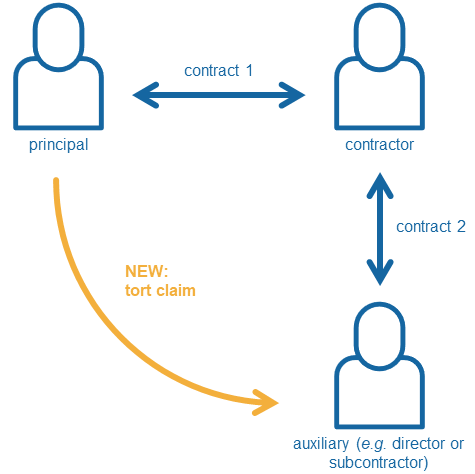What will change?
In a business context, parties often delegate the performance of their contractual obligations to auxiliaries. This happens as soon as a legal entity enters into a contract. Formally, the legal entity is the contracting party. But in practice the performance of the contract is left to an auxiliary / physical person such as an employee or a director. Similarly, independent subcontractors qualify as auxiliaries to the main contractor.
Let's first look at the situation under current law. When an employee, company director or subcontractor commits a fault in the context of her/his assignment as an auxiliary, the customer (the principal) who is prejudiced by that fault is legally prevented – unless in exceptional circumstances – from pursuing a claim directly against that employee, director or subcontractor. The customer (the principal) can only bring a claim against its own contractual counterparty (the contractor). Auxiliaries are in other words quasi-immune from claims by the principal.
This regime, which forms a cornerstone of Belgian liability law, will now be abolished. Under the new rules, the principal will not only have a contractual claim against its contractual counterparty. It will also have a second tort claim directly against the auxiliary. Confronted with such claim, the auxiliary can base its defence on both contracts: it can rely on the terms and liability limitations in the contract concluded between itself and the contractor to which the principal is not a party, but also on the terms and liability limitations in the contract concluded between the contractor and the principal.

What will this mean in practice?
Company directors, independent subcontractors and employees will be exposed to a new type of claim. Depending on your perspective, that implies additional risks or additional opportunities.
Will the new rules result in a surge of claims against auxiliaries? This remains to be seen. We suspect that a claim against auxiliaries will often not be practical or appealing. Regularly, companies are not aware that their contractual counterparty involved an auxiliary, who the auxiliary is, or for what exact facts or shortcomings the auxiliary could be held responsible. Additionally, principals generally do not have information on the terms of the contract between their contractor and its auxiliary, and therefore cannot anticipate the defences the auxiliary could employ.
Liability claims against employees will in any case remain particularly challenging, as employees continue to benefit from the far-reaching liability limitations set out under Belgian employment law. A customer who would want to hold an employee personally liable will have to show that the employee committed intentional or gross misconduct or repeated minor faults.
Nevertheless, there are cases where a principal might decide to bring a claim against a contractor's auxiliary. For instance when the contractor is insolvent and the auxiliary is not. A claim against an auxiliary could also be used as a strategic maneuver to exert pressure for instance on a director personally, or to obtain information. By starting proceedings against both, a principal could try to trigger a debate between a contractor and its auxiliary. In that debate, information and arguments might be revealed that are of interest to the principal.
What actions should you take?
It is advisable to evaluate the risks posed by these new rules for both yourself and your organization, and to prepare accordingly. When concluding new contracts it is recommended to now dedicate specific attention not only to contractual liability, but also to tort liability.
If you want to limit or exclude claims against your employees or directors, you can add liability limitation clauses in contracts with your clientele. Alternatively, you could include a liability limitation clause in the contract with your auxiliary. Indeed, the auxiliary will be able to invoke the terms of that contract against the customer, should that customer bring a claim against her/him. An additional precaution is to set up or improve insurance coverage for employees' and directors' civil tort liability (many companies already have this).
If you foresee to be rather on the claiming side and may want to bring claims against your counterparties' auxiliaries, it might be beneficial to already establish contractual arrangements to streamline such claims. One approach would be to incorporate clauses requiring your counterparties to disclose information on auxiliaries or even obliging the counterparty to seek your prior approval on the terms of any contracts to be concluded with auxiliaries.
When will the new rules come into force?
Six months after their publication in the Belgian State Gazette. A specific date has not yet been confirmed, but the latest information we have is that the new rules will likely enter into effect on 1 January 2025.
Should you have any questions on this topic, please reach out to any member of our litigation team.